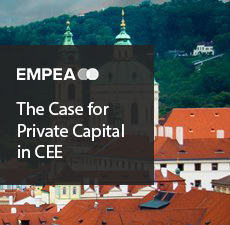 The Case for Private Capital in CEE
The Case for Private Capital in CEE
CEE/CIS Q1 2018 Data Insight
After a strong 2017, which included the largest deal in the region on record, 2018 began quietly for private capital in CEE and CIS. Fund managers completed just 14 deals for US$91 million, down from a 14-quarter high of 38 deals in Q4 2017. However, 2018 may not stay quiet for long. In April, Advent International announced a binding offer to acquire Prague-
headquartered pharmaceuticals manufacturer Zentiva for EUR1.9 million (US$2.4 billion), which would eclipse last year’s Allegro acquisition if closed. Mid Europa Partners is also reportedly raising its fifth fund with a target of EUR800 million (US$961 million), which would be the fourth-largest fund raised in CEE since the financial crisis. Large funds attract headlines, but the majority of vehicles seeking capital to invest in the region are targeting less than US$250 million in commitments. As discussed in the EMPEA Brief: The Case for Private Capital in CEE, Central Europe’s lower middle market remains underserved by capital. Elsewhere in the region, Horizon Capital completed an IPO  of Moldova-based Purcari Wineries on the Bucharest Stock Exchange, representing the first private equity-backed IPO of a Moldovan company recorded by EMPEA. Overall, managers have exited five companies via public markets transactions in Q1 2018—on track to surpass 2017’s already record-high total of 13 companies.
of Moldova-based Purcari Wineries on the Bucharest Stock Exchange, representing the first private equity-backed IPO of a Moldovan company recorded by EMPEA. Overall, managers have exited five companies via public markets transactions in Q1 2018—on track to surpass 2017’s already record-high total of 13 companies.
View all Q1 2018 Data Insights here.
EMPEA on the Road: 3rd Annual Executive Briefing on Private Equity in Turkey and Environs
The 3rd Annual Executive Briefing on Private Equity in Turkey and Environs, which was held by Globalturk Capital in partnership with EMPEA, convened over 200 delegates from more than 100 countries and representing over US$1 trillion in assets. President Recep Tayyip Erdoğan emphasized in a written message that Turkey has not closed down but opened up further to the world and values the contribution of private equity and venture capital funds to the economy.
Addressing the audience of global investors, Erdoğan said: “Incubation centers, research centers, fast-growing private equity funds and the granting, incentive and aid mechanisms that support our state show the value that we give to entrepreneurship. On the other side, a growing number of our companies are partnering with international ones.” His message continued, “We attach great importance to the contribution of private equity and venture capital funds to the economy. Unlike classical investments, we know that the strong growth appetite of fund investments has coincided with our growth targets, which can lead to productive and profitable results for all parties. In this context, we’ll be offering investors many more possibilities besides the Sovereign Wealth Fund, which will soon start its operations. By simplifying the company startup process, we make it easier to invest and accelerate legal and administrative processes related to investments. We reduce foreign trade costs, which will facilitate the integration of investments into domestic and foreign markets.”
Read Globalturk Capital’s press release here.
UK General Election Impact on Brexit: Overview of Events for EM PE Funds
The UK has had its first general election since it voted to leave the European Union (EU) last year, just weeks ahead of the start of Brexit negotiation talks. The asset management industry continues to face a period of uncertainty whilst we wait to see how the UK/EU relationship will take shape, particularly what it might mean for UK and EU investor appetite for emerging market private equity funds. This article gives an update on the implications—if any—that the UK’s general election on 8 June 2017 has on Brexit and provides an overview of the current state of affairs.
Download the full article here.
Response to Call for Evidence ESMA: AIFMD Passport and Third Country AIFMs
EMPEA respects ESMA’s mission to gather input on the key issues that will determine the orientation of ESMA’s opinion to the European Parliament. EMPEA is mindful of ESMA’s responsibility to submit an opinion to the European Commission on the following matters by 22 July 2015: 1) the functioning of the EU passport under the AIFMD; and 2) the functioning of the marketing of non-EU AIFs by EU AIFMs in the EU and the management and/or marketing of AIFs by non-EU AIFMs in the EU (under the national private placement regimes); and 3) whether the current passporting regime should be extended to the management and/or marketing of AIFs by non-EU AIFMs and to the marketing of non-EU AIFs by EU AIFMs. EMPEA has focused this submission on point 3. Our GP members with direct experience of points 1 and 2 note their strong agreement with EVCA’s submission on these points. We stand ready to provide whatever further contribution to this work the Commission might find helpful, including attending meetings and contributing further materials in writing.
Read EMPEA’s full submission and response here.
EMPEA’s Response to HM Treasury’s Proposal
EMPEA welcomes the opportunity to respond to HM Treasury’s Proposal on using Legislative Reform Order to change partnership legislation for private equity investments (July 2015) and submits this response on behalf of its members. In summary, EMPEA strongly supports the proposed reforms and believes that they will ensure the continued commercial viability of English and Scottish limited partnerships as private fund vehicles and, thereby, will improve the competitiveness of the United Kingdom as a jurisdiction of choice for (UK and foreign) private fund managers. In addition, we have reviewed the response prepared by the BVCA. We support and second that response.
Read EMPEA’s full response here.
EMPEA Submission: BEIS Scotland Call for Evidence: Review of Limited Partnership Law
Limited partnerships are the vehicle of choice for private equity and venture capital funds, and both English and Scottish limited partnerships are commonly used to bring significant economic benefit in emerging markets across the globe.In summary, it is our view that, if limited partnerships are being used as an enabler of criminal activity, this should be tackled primarily using existing investigative and enforcement powers. Given the significant use of Scottish limited partnerships for legitimate enterprises, we would strongly advocate against increasing regulatory and compliance burdens on limited partnerships. In addition, we have reviewed the response prepared by the British Private Equity & Venture Capital Association (“BVCA”). We support and second that response.
Download EMPEA’s full response here.
ESMA’s Latest Advice on AIFMD: Extending the AIFMD Marketing Passport to Non-EU Fund Managers
ESMA published Advice to the European Parliament, the Council and the Commission on the application of the AIFMD passport to non-EU AIFMs in July, 2015. On July 18, 2016, ESMA published its further Advice addressing the possibility of extending the AIFMD marketing passport to non-EU based fund managers, and the non-EU countries which could be able to benefit from the passport. In 2015 ESMA published advice on six non-EU countries, setting out that the AIFMD passport could be extended to Jersey, Guernsey and potentially Switzerland, but noting that further consideration was needed to be given to the US, Singapore and Hong Kong.
Read the full article here.
Assessing Challenges and Opportunities for Private Equity in Russia and CIS
Private equity in Russia and the Commonwealth of Independent States (CIS) has been buffeted in recent months and years by successive political and economic crises, most notably currency depreciation, declining oil prices, economic estrangement from Europe and military conflict in Ukraine. Indeed, between 2014 and 2015 the Russian ruble depreciated significantly against the U.S. dollar, while crude oil prices fell from more than US$60 a barrel to less than US$40 a barrel (see Exhibit 1). In EMPEA’s 2015 Global Limited Partners Survey, Russia and the CIS was ranked as the least attractive emerging market region for investment in the coming years by limited partners. However, as many investors can attest, the best deals are often struck when markets are struggling rather than booming. During 2015, the consumer services and technology sectors showed particular promise, attracting the majority of both capital invested and the number of deals (see Exhibit 2). In this Views from the Field, veteran fund managers and investors in Russia and the CIS share their assessment of the state of private equity in the region and their outlook for the asset class going forward.
Read the full article here.
Evaluating the State of the Venture Capital Market in Turkey with Cem Baytok, Managing Partner, idaCapital
The Turkish VC market is at the tipping point of major growth. In the last two years, noteworthy technology acquisitions have been completed (e.g., Germany-based online food delivery company Delivery Hero’s US$589 million acquisition of Turkey-based online food delivery company Yemeksepeti); Turkish entrepreneurs have shown success in Silicon Valley (e.g., Turkey-based online learning platform Udemy); and most importantly, a vibrant market economy has driven the emergence of new start-ups and helped them to create, on average, 10 to 20x enterprise value growth in Turkey, according to market analytics company Startups.watch.
Read the full article here.